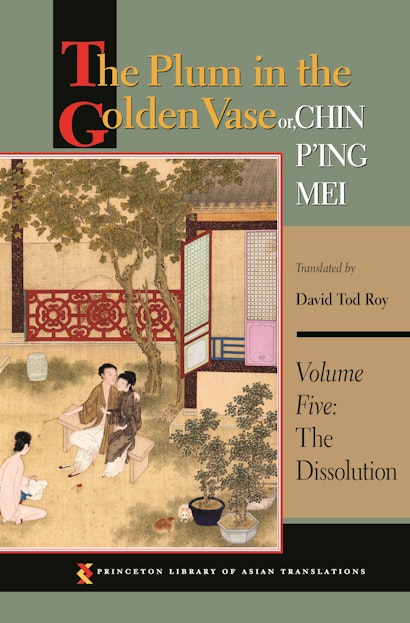This is the fifth and final volume in David Roy’s celebrated translation of one of the most famous and important novels in Chinese literature. The Plum in the Golden Vase or, Chin P’ing Mei is an anonymous sixteenth-century work that focuses on the domestic life of Hsi-men Ch’ing, a corrupt, upwardly mobile merchant in a provincial town, who maintains a harem of six wives and concubines. The novel, known primarily for its erotic realism, is also a landmark in the development of the narrative art form—not only from a specifically Chinese perspective but in a world-historical context.
This complete and annotated translation aims to faithfully represent and elucidate all the rhetorical features of the original in its most authentic form and thereby enable the Western reader to appreciate this Chinese masterpiece at its true worth.
Awards and Recognition
- One of Choice's Outstanding Academic Titles for 2014
- One of The Wall Street Journal Bookshelf Best Books of 2013, chosen by Tash Aw
"The story sprawls. There are more than eight hundred named characters, from high officials and military commanders to peddlers and prostitutes, with actors, tailors, monks and nuns, fortunetellers, acrobats, and many others, even cats and dogs, in between. Roy helps us keep track of everyone in a fifty-six-page 'cast of characters.'. . . In the original woodblock printing of the text, characters follow one another, without punctuation, no matter their source. Modern printings provide punctuation, but Roy goes further by devising a system of indentation and differing type sizes to set off allusions, poems, and songs. With this editorial help, the translation is actually easier to read than the original."—Perry Link, New York Review of Books
"David Tod Roy, after more [than] 20 years of work, completed the fifth volume of his translation of the Chin Ping Mei, entitled The Plum in the Golden Vase. It's a masterpiece [and] an epic scholarly achievement. . . . The world of the Chin Ping Mei is beautiful and dark, cheap and exalted, righteous and profane, gorgeous and lurid and stinking and glorious."—Stephen Marche, Los Angeles Review of Books
"Roy's complete translation makes it possible for English readers everywhere to read and appreciate this work, one of the great, sophisticated masterpieces of world literature."—Choice
"Roy's translation . . . is both more complete and more readable than previous English translations. . . . Roy's rendering deftly switches between registers along with the novel, carrying across both its refined language and its infamous vulgarities."—Scott W. Gregory, Ming Studies
"One can only begin to appreciate the work that has gone into this volume, with its numerous pages of notes, bibliography and index, and to the five volumes as a whole. . . . We are indebted to Professor Roy. The novel is a masterwork of Chinese fiction, and we celebrate the completion of his translation."—Andrew Lo, Bulletin of the School of Oriental and African Studies
"The immensity of David Tod Roy's achievement in the eld of literary translation can hardly be overstated. . . . We are all . . . tremendously indebted to Roy’s erudition and his indefatigable work of defamiliarization. No one can ever look at a proverb with the same complacency after reading Roy’s translation."—Maria Franca Sibau, Journal of the American Oriental Society
"Praise for the previous volume: "[A] book of manners for the debauched. Its readers in the late Ming period likely hid it under their bedcovers.""—Amy Tan, New York Times Book Review

